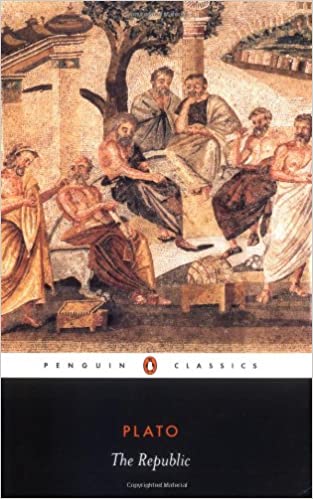
Notes on
The Republic
by Plato
• 4 min read
Socrates never actually wrote anything down. Instead, his student, Plato, did write things down.
In the story, Socrates is asked to come along with some men, and finally they started discussing justice.
Socrates follows the men, and then meets an older man, whom he asks some questions. One question leads Socrates to say that he defined justice showhow, which is what sparks the discussion.
The general procedure is that they ask Socrates to do the investiongation, and they follow along. Socrates asks questions and uses some rhetoical techniques to come to conclusions.
To make their claims, they end up building a State. This is because, as it is with the individual, so it is with the state—the state is just a larger picture of the same. Therefore, they had to create a state to investigate individual justice & injustice. This happens as Socrates talks to Adeimantus (and others).
Socrates talks to various people, but Thrasymachus is one of the first ones during the conversation. However, he kind of dissapears after a bit. I think Socrates convinced him, as they ended with Socrates disproving his claim, and proving his own. Thrasymachus basically said “might makes right,” and that justice is what the strong says it is.
Socrates believed that a rules does what is in the best interest of their subjects.
But as counterargument to that: the ruler is interested in the subjects, so they in turn act in his interest. That is why he is interested in the first place.
So they end up examining the injust man that, as far as the public knows, is entirely just versus the just man that, as far as the public knows, is entirely unjust.
The Good Man
And now, the good man:
- Pursues virtue (justice, wisdom, temperance, courage)
- Does physical training, not for the sake of strength, but for harmony of the soul
- Regulates monetary gains & property as to avoid the superfluous, and spends only to his means
- He does that which makes him a better man, and avoids that which disorders his life
- he may pursue statesmanship, given the conditions of the established State (built by Socrates et al.). And recall, here, leaders lead out of necessity, not of desire to rule
Philosophers are seekers of knowledge and wisdom.
A philosopher is a lover of wisdom.
Who better to rule than a philosopher? They speak of philosopher-kings.
The Allegory of the Cave
Imagine a cave that is open towards the light, which reachs all the way in.
There lives some men in the cave, and they’ve lived their all their lives. Their legs and necks are chained, so they cannot move—they can only see what is before them, as they are prevented from turning their heads.
Above and behind them is a blazing fire. Between the fire and the prisoners is a raised way. And there is a low wall built along the way, analogous to the screen marionette players have in front of them as show the puppets.
Men pass along the wall, carrying all sorts of things: vessels, statues, and figures of animals, made of vairous materiaals. These appear over the wall. Some of the men who pass talk, and some are silent.
This is the allegory of the cave.
If a prisoner were to ascend from the cave, only to later descend back, his sight would be worse in the dark.
From this, the others may conclude that he ascended and descended only to lose his sight. They may even make ascension illegal.
Ascent to the world of intellect takes effort, but it is worth the struggle. Such is the allegory.
Philosophers should venture out of the cave, into the intellectual world. And then they should descend back down. Once their eyes have accustomed to the dark, they shall see many times clearer than the prisoners.
I believe this means they are bound by duty to guide and work for the state, in the human and stately affairs. They cannot be in the intellectual World forever.
The Theory of Forms
And in the last chapter (book), the idea of Plato’s world of forms is presented.
Whatever you may create is an imitation, for there exists, in some world of forms, the ideal after which you strove during creation.
You can only make the semblance of something, not the true thing.
Those who most want to lead are worse at it
The organizations and hierarchies in which people most want to lead (usually a lust for power) are worse lead.
Leaders should not be eager, almost demanding to lead. They lead out of necessity.
Do not desire political power for the sake of it. Only lead out of necessity—if something isn’t as good as it could be, and you could guide it to where it would be.
Liked these notes? Join the newsletter.
Get notified whenever I post new notes.